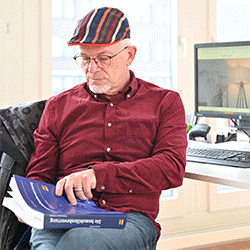Basically, anyone who wants to sell or rent a house or flat or flat needs an energy performance certificate. If the energy performance certificate is missing at the time of the viewing or if the the law, fines of up to 15,000 euros may be imposed. Therefore you should pay attention to a few things with the energy performance certificate.
After careful consideration, you have decided to give up your your own home and enjoy a carefree retirement in an age-appropriate domicile? enjoy a carefree retirement? Especially if you are selling your house or apartment or flat sale on your own initiative, there is one thing that you must be considered in good time: An energy performance certificate must be otherwise there is a risk of high fines. It is advisable to comprehensive advice.
The energy performance certificate documents the energy standard of a house of a house, i.e. how much energy the house consumes. Simplified This is illustrated using the energy efficiency classes. The scale ranges from class A+, a very good consumption value, to class H, which indicates very high energy consumption. You will also find general information about the building, such as the year the house was built and the type type of heating, for example oil or gas.
There are two types of energy performance certificate. The demand certificate and the consumption certificate. The difference between the consumption certificate and the consumption certificate can be memorised with this little mnemonic: The Demand certificate requires a calculation. And one that is not consumption values. This is often the case with new build projects. case. The future energy consumption must already be determined in the be determined during the planning phase by means of a complex calculation. This factors such as the insulation of the exterior wall, the energy energy classes of the windows and the heating technology. But also the location of the building and the type of construction also play a role. The The theoretical basis of this calculation is always the same, so that energy values of buildings can be compared objectively. Nevertheless, the values should be viewed with caution. This is because they do not take into account heating behaviour or the typical energy consumption of a household. household.
The actual consumption values of a household are always individual and depend on the comfort zone in which the occupants feel comfortable. Those who like to take long showers and like to stay in their home at a cosy 24 degrees Celsius naturally have a worse energy balance than those energy balance than those consumers who regularly turn off the heating when they leave the house.
The decisive factor is therefore: heating and hot water utilisation. The consumption certificate indicates the energy actually consumed by a house by measuring the actual consumption. It is created with the figures for heating and hot water preparation. Both are stated in kilowatt hours per year and square metre of usable building area. The calculation is usually based on heating bills from the last three years. last three years. Although the consumption certificate is not as informative as the consumption certificate, but it is cheaper to produce. preparation.
However, attention should be paid to who creates it. creates it. There are many cheap offers on the Internet, but you should be be careful, as the quality is often poor. The safest is to seek advice. Thanks to their many years of experience, property experts know who can issue you with a suitable energy performance certificate. As a rule, these are qualified and authorised specialists such as architects, engineers, master craftsmen with with appropriate additional training or energy consultants. In doing so You should ensure that the consultants are independent. At the Federal Office for Export Control (BAFA), the KfW Banking Group or the German Energy Energy Agency (dena) you will find lists of independent and qualified qualified experts.
Do you have questions about the energy certificate? Let our experts advise you.









